
| Home | About | FAQs | Feedback | Take Action | Downloads | MythWatch | Advanced Advocacy | Store |
|
Rise of the Animal Welfare Industrial Complex
|
Even the most basic study of successful social justice movements throughout human history shows that today's corporatized animal charities are contradicting well-established principles of justice advocacy. Consider this introductory statement made in Farm Sanctuary's "welfare reform" video: 
It is hard to imagine a more inaccurate characterization of the historical record. In reality, the leaders of past social justice movements inspired vast numbers of people largely because they were uncompromising visionaries who directly stated what was wrong and what needed to be done to make it right.
Taking such a forthright and direct approach was not "easy" or the result of "magical thinking," as the narrator of Farm Sanctuary's "welfare reform" video misleadingly claims. Indeed, the next line of the Seneca Falls declaration states:
The pioneers of the women's rights movement did not stick to their publicly-stated principles as a matter of "personal purity" -- a derogatory label used by the narrator of Farm Sanctuary's "welfare reform" video to marginalize those who practice activism in the social justice tradition. They did so because it was necessary to bring clarity, focus, and strength of purpose to their movement, which was essential to unifying the efforts of vast and diverse coalitions of people over the course of decades of sustained effort. It is both cynical and condescending to characterize time-tested ways of working for justice as "magical thinking," and to then suggest that the liberation of animals is best approached as a protracted business negotiation in which one's true objectives are deliberately concealed. Pursuing an unending series of adjustments to the process of exploitation may change the terms of a societal injustice, but it does not lead to its abolishment.
Consider the absurd, disheartening outcomes that could have resulted if the leadership figures of past justice movements had adopted the approach recommended by the narrator of Farm Sanctuary's "welfare reform" video: Martin Luther King, Jr. and other civil rights leaders might have focused on collaborating with racist lawmakers to establish national standards for regulating "separate but equal" bathroom facilities, classrooms, and lunch counters. Instead, they used their time, passion, and resources to build a successful national movement that openly demanded civil rights for African Americans.
Instead, they applied their time, passion, and resources to building a successful movement that would end colonialist domination of their country and achieve complete independence from Britain. Thomas Clarkson, Ouladah Equiano, William Wilberforce, and other English anti-slavery advocates might have focused on working with the slave shipping industry to lower the "stacking densities" in their vessels, and on publicly applauding the Church for creating "Christian" standards for the punishment of rebellious slaves.
Given that the argument presented in Farm Sanctuary's "welfare reform" video is based on the gross mischaracterization social justice history, how much credibility should be granted to the many assertions about animal advocacy that come later in the video?
Today, a few wealthy, corporatized charities dominate the US animal advocacy community. Their sponsorship money and their speakers can be found at nearly every vegetarian, vegan, animal protection, and animal rights event of any size across the country. Because they control the vast majority of available resources for animal advocacy, as well as access to publicity and large audiences, many smaller organizations, as well as authors, academics, and conference presenters, are subject to their influence, and in some cases, their direct control. Hence, their executives are able to define from one day to the next what is, and what is not, "good for the cause," confident that most will unquestioningly follow and few will dare to question. The situation can be likened to living in a "company town," where one corporate conglomerate with arbitrary power sets the agenda and makes the rules, with little to no transparency or accountability. It's no surprise, then, that the individuals and organizations that regularly collaborate with the animal-using industry and promote "humane" animal products refrain from publishing statements detailing the principles, values and ethics that guide their work. This allows a handful of charismatic company men (notably, there seem to be few women in these leadership roles) to operate in an "anything goes" climate. They are free to do almost anything that serves their personal and organizational agendas, regardless of how it affects grassroots activists or the long-term health of the cause of animal rights. The result is a climate in which personalities, and not principles, are the focus. Leadership figures style themselves as pseudo-celebrities, focusing on their own social status and dominance, rather than uplifting the status of those they claim to serve -- those beings who are dominated from the day they are born to the day they are slaughtered. This reversal of priorities tends to disillusion the more experienced educators and activists, and greatly confuses newcomers, who are being convinced that brand loyalty, unquestioning conformity, and submission to authority are the qualities needed in today's justice activists.
The Farm Sanctuary video makes an effort to "prove" the validity of so-called welfare (husbandry) reforms as a path to animal liberation, when the current controversy in the animal rights movement does not even revolve around husbandry reforms themselves. Rather, it revolves around unanswered questions about how wealthy, corporatized advocacy groups justify misleading the public, collaborating with animal exploiters, promoting "humane" animal products, and engaging in egregious conflicts of interest. The groups in question have yet to offer a convincing explanation for why they persistently engage in such activities (see left column for details) -- none of which is required for working toward the husbandry reforms they claim are the key to animal liberation. Equally troubling, all of these controversial activities directly or indirectly enrich the bottom line of these corporatized advocacy organizations. To get a sense of how far astray the US animal advocacy movement has gone under the influence of corporatized charities, consider how the following real-life examples would look if equivalent actions were taken by influential people and organizations said to be fighting for human rights.
Bruce Friedrich, former vice president of PETA and current director of strategic initiatives at Farm Sanctuary, is also one of the founding board members of Farm Forward, an organization that focuses on developing and promoting "humane" animal products. Farm Forward recently acted as the conduit of a $151,000 grant from the ASPCA to turkey farmer (and fellow Farm Forward board member) Frank Reese to expand his "humane" turkey operation. How can a director of an organization that provides sanctuary to turkeys rescued from a hopeless existence in animal agriculture justify enabling and enriching the very industry that will bring more doomed turkeys into existence to be exploited and killed? Would this kind of betrayal ever be acceptable for an organization whose public identity was based on providing a safe haven to a group of persecuted and oppressed human beings?
The Humane Society of the United States (HSUS) currently employs a pig farmer, Joe Maxwell, as its director of rural outreach. On his website, Mr. Maxwell claims that the thousands of pigs he exploits and kills are "raised like children." The HSUS represents itself as an animal protection group. Can we imagine an organization that claimed to protect a group of oppressed people employing as director and spokesperson someone who profits from the killing of thousands of vulnerable human beings?
Would an organization advocating for oppressed people that was entangled in so many blatant conflicts of interest be able to retain any credibility whatsoever? Would representatives of such an organization be able to convince advocates that pursuing activities that enrich the exploiters is a legitimate way to protect members of an oppressed group or to advance human rights?
Both HSUS and Farm Sanctuary have directly participated in the development and public endorsement of "new and improved" standards for the use and killing of animals. Receiving public approval from these high-profile animal protection organizations has created significant benefits for large-scale animal exploiters such as Wolfgang Puck and Whole Foods. Such "animal-friendly" labeling schemes that advocacy organizations publicly applaud help create a lucrative and growing market for so-called "humane" animal products. Specifically, these particular industry-advocacy collaborations:
Could organizations claiming to be working on behalf of oppressed human beings justify programs and initiatives with consequences like these? If not, then how can such programs be justified by organizations working to "protect" and even to "liberate" animals, as is implied in Farm Sanctuary's "welfare reform" video? Large numbers of dedicated educators and activists want substantive answers to these important questions -- questions that speak directly to what is dividing and disempowering today's animal rights movement. By avoiding debate of these critical concerns, the corporatized groups are only further dividing our movement and degrading the meaning of animal rights.
The first step toward earning the trust of the public is to respect ourselves and the vulnerable beings whom we are committed to liberating from oppression. Is it respectful to collaborate with corporations that use and kill those whose interests we claim to serve? What about denigrating, diluting, and denying the core principles that inspire our work, or mocking those of us who earnestly strive to serve these guiding principles? How about creating programs that maximize fundraising while undermining the foundations of long-term change? Is it respectful to use public concern about animal exploitation to promote the sale of products derived from animal exploitation? Anyone who claims that a movement seeking justice or liberation can be predicated on these forms of dishonesty and disrespect is well on the way to strengthening, rather than weakening, the bonds of oppression.
Donald Watson, who first coined the term "vegan" in 1944, offered this wisdom upon founding the UK's Vegan Society and launching the modern-day vegan movement:
Donald Watson made this statement in the midst of a world war, during an era when the struggle to gain public support for the animals' cause was so much more difficult. Today, there is overwhelming scientific evidence that the vegan way of life is better for the environment and our health. Cognitive ethologists are proving beyond a shadow of a doubt that animals have emotions, strong family bonds and self-awareness. There is an ever-greater variety of vegan products on the market capable of satisfying every possible culinary craving. With all these and many more powerful breakthroughs for our advocacy that have come about since Donald Watson initiated the vegan movement, are we to believe that it is just too difficult to live up to the inspiring legacy he and his fellow visionaries left in our care?
The great social movements of the past were built on the bedrock of conviction and clarity, not on an ever-shifting foundation of pessimism and habitual collaboration with exploiters. The leaders of these movements were able to inspire millions of people to join in, and it was not by convincing them to betray their own ideals or to manipulate the public with clever lies. Quite the opposite, they encouraged those seeking justice to pursue their ideals with ever-greater integrity and passion, and to share with the public the very same truths that inspired their own awakening. The only thing standing in the way of the animal rights movement becoming a great social justice revolution is a poverty of imagination and a shortfall of personal conviction. It is up to all of us to transcend the cynicism of these times, and to reach for something higher. We must look within ourselves, and to each other, to find the strength to do what needs to be done -- for the animals, for our planet, and for the good of the generations to come. Justice is conscience, not a personal conscience but the conscience of the whole of humanity. Those who clearly recognize the voice of their own conscience usually recognize also the voice of justice. --Aleksandr Solzhenitsyn More essays, articles and videos on this subject can be found here.
Producer James Laveck and Director Jenny Stein are the founders of Tribe of Heart and creators of the award-winning documentaries The Witness and Peaceable Kingdom: The Journey Home. For the last 12 years, their work has focused on the emerging new ethics of the human-animal relationship and the journey of awakening conscience.
|
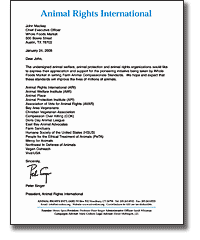
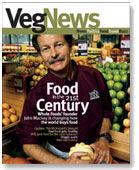
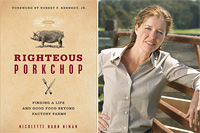
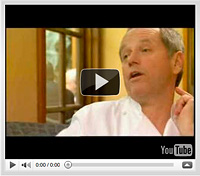
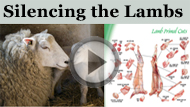
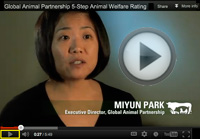
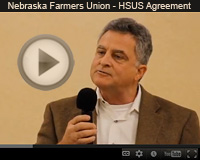
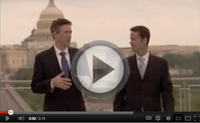
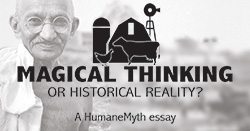
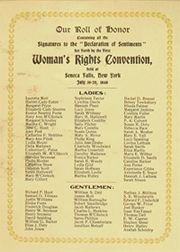 For example, those who gathered in Seneca Falls, New York, for the first women's rights convention in 1848, published a
For example, those who gathered in Seneca Falls, New York, for the first women's rights convention in 1848, published a 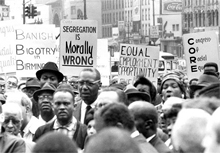 How history might have looked without the "magical thinkers"
How history might have looked without the "magical thinkers" Mohandas Gandhi and his fellow patriots might have spent decades negotiating with the British for new standards for the Empire to exploit India's people and natural resources in a more "humane" way.
Mohandas Gandhi and his fellow patriots might have spent decades negotiating with the British for new standards for the Empire to exploit India's people and natural resources in a more "humane" way. 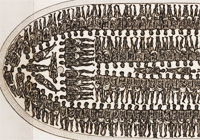 Instead, they dedicated nearly all their time, passion, and resources to building a successful national movement that demanded, first, the abolishment of the slave trade, and next, the end of the institution of human slavery itself.
Instead, they dedicated nearly all their time, passion, and resources to building a successful national movement that demanded, first, the abolishment of the slave trade, and next, the end of the institution of human slavery itself.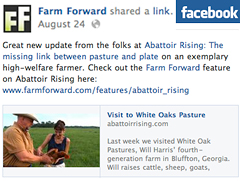
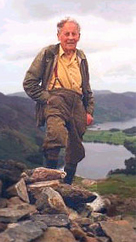 A common criticism is that the time is not yet ripe for our reform. Can time ever be ripe for any reform unless it is ripened by human determination? Did Wilberforce wait for the 'ripening' of time before he commenced his fight against slavery? ... There is an obvious danger in leaving the fulfillment of our ideals to posterity, for posterity may not have our ideals. Evolution can be retrogressive as well as progressive, indeed there seems always to be a strong gravitation the wrong way unless existing standards are guarded and new visions honoured.
A common criticism is that the time is not yet ripe for our reform. Can time ever be ripe for any reform unless it is ripened by human determination? Did Wilberforce wait for the 'ripening' of time before he commenced his fight against slavery? ... There is an obvious danger in leaving the fulfillment of our ideals to posterity, for posterity may not have our ideals. Evolution can be retrogressive as well as progressive, indeed there seems always to be a strong gravitation the wrong way unless existing standards are guarded and new visions honoured.